| 日時 | 2009年3月30日(月) |
|---|---|
| 場所 | AA研 マルチメディアセミナー室(306) |
- 吉村 貴之(AA研非常勤研究員)
- 「アルメニア「本国」と在外同胞との関係〜アルメニア再独立期を中心に」
- 錦田 愛子(AA研非常勤研究員)
- 「レバノン政治体制とパレスチナ難民〜「7つの村」住民の国籍取得をめぐって」
| 日時 | 2009年3月30日(月) |
|---|---|
| 場所 | AA研 マルチメディアセミナー室(306) |
| 日時 | 2009年3月12日(木) |
|---|---|
| 場所 | AA研マルチメディア会議室 (304) |
| 使用言語 | 英語(通訳無し) |
| 参加費無料、事前申し込み不要 |
| 日時 | 2009年3月4日(火) |
|---|---|
| 場所 | 本郷サテライト 7F会議室 |
| 使用言語 | 英語(通訳無し) |
| 参加費無料、事前申し込み不要 |
| 日時 | 2009年2月22日(日) 14:00-17:00 |
|---|---|
| 場所 | ユーラシア文化研究センター(羽田記念館) 京都市北区大宮南田尻町13 |
| 使用言語 | 英語(通訳無し) |
| 参加費無料、事前申し込み不要 |
ヨーロッパを代表するイラン・中央アジア史研究者、Birgitt Hoffmann氏(ドイツ・Bamberg大学)、Maria Szuppe氏(フランス・CNRS)を招聘いたしました。
“Without Stopover for Transit:Direct Exchange between Arabic and Japanese Literatures”
| Date / Time | Friday, February 20, 2009. 18:00-20:30 |
|---|---|
| Venue | Crowne Plaza, Hamra Street |
| Language | Arabic and English (simultaneous interpretation available) |
| For further Information | 01-975851 (JaCMES) |
| 18:00-18:05 | Welcome Address: Prof. Hidemitsu Kuroki (Director, JaCMES) |
|---|---|
| 18:05-18:45 | Lecture 1: Prof. Mari Oka “What Can Novels Do? The Significance of Reading Arabic Novels in Japan during Times of Deaths” |
| 18:45-19:05 | Discussion |
| 19:05-19:20 | Coffee Break |
| 19:20-20:00 | Lecture 2: Dr. Mohammed Oudaimah “Introduction to Japanese Faiths through Kojiki” |
| 20:00-20:20 | Discussion |
| 日時 | 2009年1月24日(土) 14:00-18:00 |
|---|---|
| 場所 | AA研 大会議室(303) |
| 使用言語 | 英語 |
| 参加費無料、事前申し込み不要 |
| 日時 | 2009年1月20日(火) 17:30-19:30 |
|---|---|
| 場所 | 本郷サテライト 7F会議室 |
| 共催 | イスラーム地域研究東大拠点 |
| 参加費無料、事前申し込み不要 |
ライデン大学のTouraj Atabaki氏を招聘いたしました。
アターバキー氏は、イラン・アゼルバイジャン現代史に関する研究をはじめ、イラン、トルコ、コーカサス、中央アジアの近現代史に関して幅広い仕事をされています。
また、アムステルダムの国際社会史研究所においては中東・中央アジア部門の責任者でもいらっしゃいます。
| 日時 | 2009年1月11日(日) 11:00-15:00(10時40分開場) |
|---|---|
| 場所 | 如水会館1階 如水コンファレンスルーム 東京都千代田区一ツ橋 2-1-1 |
| 参加費無料、最大100名まで |
【 報告内容 】(音声記録を起こしたものです)
中東イスラーム研究教育プロジェクトは、如水会館にて緊急集会「イスラエルによるガザ侵攻を考える」を実施しました。急な呼びかけにもかかわらず、一般市民の皆様を中心に研究者、NGO関係者、メディア関係者等、270名余のご参加をいただき、熱気溢れる会となりました。ご参加、ご協力いただいた皆様に感謝申し上げます。
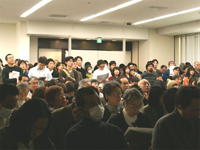
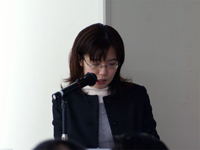
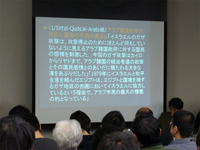
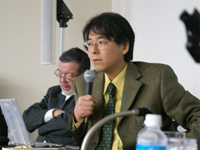
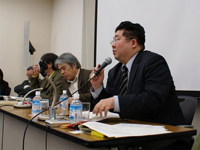
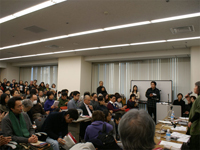
“Political and Economic Relations between the Middle East and Japan: Perspectives from the Past to the Future”
| Date / Time | Friday, November 21, 2008. 18:00- 20:15 |
|---|---|
| Venue | Crowne Plaza, Hamra Street |
| Language | Arabic and English (simultaneous interpretation available) |
| For further Information | 01-975851 (JaCMES) |
| 18:00-18:10 | Welcome Address: Prof. Hidemitsu Kuroki (Director, JaCMES) |
|---|---|
| 18:10-18:50 | Lecture 1: Prof. Hiroshi Kato “The Middle East within Asia: A Note on the Middle East in the Context of Asia from a Historical Perspective” |
| 18:50-19:05 | Discussion |
| 19:05-19:20 | Coffee Break |
| 19:20-20:00 | Lecture 2: Prof. Michael Penn “The Role of Democratization in Contemporary Japan-Arab Relations” |
| 20:00-20:15 | Discussion |
“Muslims and Islamic Studies in Japan ”
| Date / Time | Wednesday, October 15, 2008. 18:00-20:00 |
|---|---|
| Venue | Japan Center for Middle Eastern Studies(JaCMES), 2nd Floor, A2-1, Azariyeh Bldg, Beirut Central District |
| Language | English |
| For further Information | 01-975851 (JaCMES) 01-553604 (Umam Documentation & Research) |
| The meeting is open to the public |
The lecture outlined the historical background to the Cyprus question as an issue of implementation of the principle of self-determination enshrined in the Atlantic Charter (1941) as well as in the UN Charter (1945). The Cypriot demand for self-determination was in the 1940s equivalent to enosis, the union of the island with Greece ? especially as this was implicitly promised to the Cypriots by Winston Churchill. As the Nazi Germans occupied Greece in 1941, the wartime British PM urged on the islanders to voluntarily join the British forces in order to “fight for freedom, fight for Greece”. The Greek Cypriots responded joining the war efforts in their thousands; only to be betrayed as the defeat of Nazism did not bring the promised enosis but a continuation of the colonial rule. Moreover in 1954, the British started building up two powerful military bases on the southern coast of the island, which were reinforced after the Suez debacle a couple of years later.
Their withdrawal from the UN mandate for Palestine (1948) coupled with the evacuation of their forces from Suez forced the British to transfer their Middle East Military Headquarters to Cyprus. The strategic importance of the island as a staging post for operations in the region grew exponentially. The building of the RAF Akrotiri airbase turned the island into an unsinkable aircraft carrier, firmly anchored in the Eastern Mediterranean. Greece, ravaged by ten years of war (1940-49), was too weak to be entrusted such an important base. Hence the 1960 Treaties between the UK, Turkey and Greece produced a Republic of Cyprus which bore more affinity to a protectorate than to a sovereign state.
The lecturer drew attention to the large presence (40,000-43,000) of Turkish troops with the state of the art weaponry occupying the northern third of the island since 1974. He explained that despite the positive climate created by the current Greek and Turkish Cypriot leaders the two sides remain apart as regards the perception of the nature of the searched for new settlement. Whereas the Greek Cypriot side perceives it as a transformation of the RoC from a unitary to a federal state without guarantor powers, the Turkish Cypriot side insists that the basis of the talks is that two states, the RoC and the self-styled TRNC are negotiating to form a new state. Moreover the TC side is unwilling to accept European as opposed to Turkish guarantees and military presence.
Last but not least, Dr Leventis placed emphasis on the role of the island regarding crisis management, humanitarian aid and peace-keeping operations to Lebanon. Since 1 May 2004, the island republic has been the EU’s outpost in the Middle East. The RoC is the southeastern-most EU member state ? lying only 240 kms away from Beirut. Tellingly, in the crisis of summer 2006, tens of thousands of Lebanese citizens were evacuated via Cyprus. The Lefkosia government has placed the airport of Larnaca, the naval port of Lemesos, as well as the Andreas Papandreou airbase in Pafos at the disposal of the ongoing UNIFIL operation. In this connection, Turkey’s high-profile role in providing substantial manpower and military hardware for UNIFIL was also noted. Turkey sought unsuccessfully to assume the naval command of the UNIFIL operation in the sea between Cyprus and Lebanon. Turkey’s bid for UNIFIL’s command raised eyebrows in the RoC in view of the continuing Turkish occupation of the northern part of its territory.
Thus a settlement of the Cyprus question which would include a phased withdrawal of the huge Turkish occupation force would enhance stability in the region.
Furthermore, in his concluding remarks, Prof. Leventis pointed out the glaring need for a comprehensive security system that will serve the best interests of all the peoples in the Eastern Mediterranean basin.
近年の東南アジアにおいて人口増や経済成長にともない急速に進む乱開発や自然環境の劣化への懸念や関心が高まっています。これまで熱帯雨林や珊瑚礁など豊かな生態環境を有する土地として知られてきたボルネオ島もその例外ではありません。
本ワークショップでは開発研究や文化人類学、霊長類学などを専門とする日本人およびマレーシア人研究者を招いて、ボルネオ島北部サバ州およびその周辺地域における自然(生態)環境と人間社会との関係の現状について報告していただき、また同時に自然と人間との共存の可能性や課題、そこで文化や現地の価値観の果たす役割等のトピックについて検討し、討議しました。
| 日時 | 2008年10月9日(木) 15:00-20:00 |
|---|---|
| 場所 | AA研マルチメディア会議室(304) |
| 15:00-15:10 | Opening Remarks by Ikuya Tokoro (ILCAA, TUFS) |
|---|---|
| 15:10-15:50 | Presentation by Mary Sintoh (Institute for Development Studies: IDS Sabah) “Practices of the Indigenous Communities in Sabah towards Conservation of the Environment” |
| 15:50-16:30 | Presentation by Noko Kuze (Graduate School of Science, Kyoto University) “The Possibility of the Co-existence of Orangutan and Human in Sabah: Ecology and Conservation of Orangutan” |
| 16:30-16:40 | Tea Break |
| 16:40-17:20 | Presentation by Katsumi Okuno (J.F.Oberlin University) “Fear of the Thunder God’s Anger: Men and Animals among the Penan of Sarawak” |
| 17:20-18:00 | Discussion Time |
* The presentation will be given in English.
| 日時 | 2008年8月27日(水) 14:00-16:00 |
|---|---|
| 場所 | School of Social Science, UMS(マレーシア大学サバ校) |